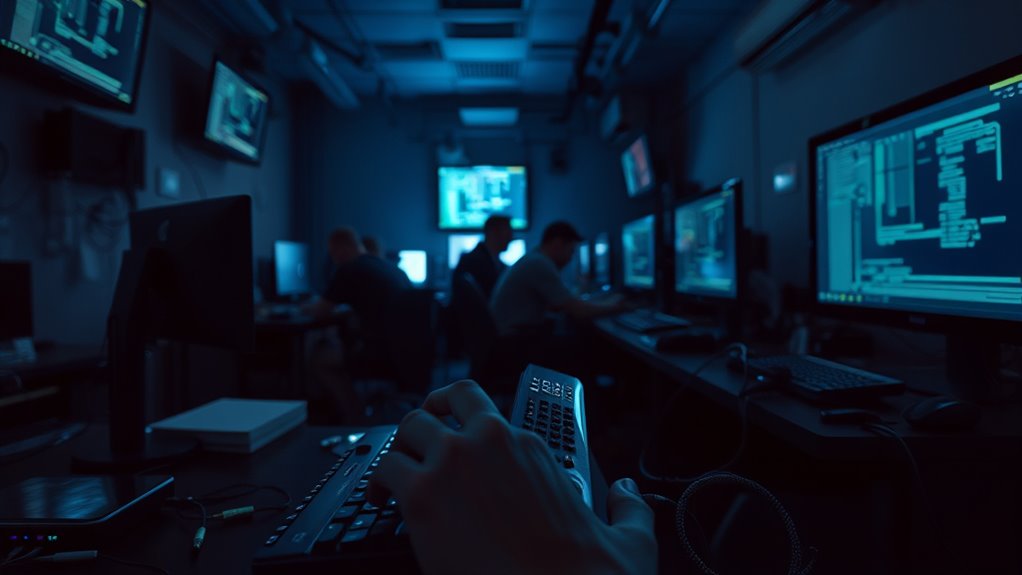The U.S. Justice Department has indicted 15 hackers, including 12 Chinese nationals, tied to a state-sponsored espionage campaign that's targeted U.S. agencies and organizations since 2011. Among the indicted are two officials from the Chinese Ministry of Public Security and employees from the i-Soon company. This operation involved hacking into critical sectors, generating millions in profits. The escalating tensions highlight cybersecurity risks you need to understand, especially if you want to protect your information and systems.
Key Takeaways
- The U.S. Justice Department indicted 12 Chinese nationals, including two Ministry of Public Security officers, for state-sponsored espionage since 2011.
- Ten employees from the company i-Soon were charged for their involvement in the hacking operations targeting U.S. agencies and organizations.
- The hacking group Silk Typhoon, linked to China, executed cyberattacks for financial gain, charging between $10,000 to $75,000 per compromised email.
- Targets of the espionage campaign included critical U.S. agencies, news organizations, universities, and religious groups.
- The U.S. government seized domains related to Silk Typhoon and offered rewards for information about the indicted cyber actors.

The U.S. Justice Department has unveiled shocking indictments against 12 Chinese nationals, including two officers from the Ministry of Public Security and ten employees from a company called i-Soon. These individuals are accused of being key players in a vast, state-sponsored espionage campaign that dates back to 2011. Their targets included not just U.S. federal and state agencies, but also dissidents and foreign ministries, showcasing the extensive reach of this operation.
Shocking indictments reveal a state-sponsored espionage operation involving 12 Chinese nationals targeting U.S. agencies and dissidents since 2011.
Central to this campaign are i-Soon and a hacking group known as Silk Typhoon (APT27). These groups executed their attacks under the guidance of China's Ministries of Public Security and State Security. You might wonder what drove these hackers to engage in such risky activities. The answer lies in the financial incentives; i-Soon charged between $10,000 and $75,000 for each compromised email inbox. With a clientele that included at least 43 bureaus of China's security ministries, they generated tens of millions of dollars between 2016 and 2023, turning cybercrime into a lucrative business.
The list of targets is alarming. Among those affected are critical agencies like the U.S. Treasury Department, Defense Intelligence Agency, and Commerce Department. News organizations, including two New York-based newspapers and a U.S. government-funded news service, fell victim as well. Even religious organizations and foreign ministries weren't spared, highlighting the broad scope of this espionage campaign. Numerous networks globally were breached to steal and sell data, further underscoring the sophistication of this operation.
Universities, defense contractors, and law firms were also on the hackers' radar, raising serious concerns about the security of sensitive information.
Following the indictments, the U.S. District Court for the Southern District of New York took decisive action. Internet domains associated with Silk Typhoon were seized, and the government even offered rewards of up to $10 million for information leading to the capture of these malicious cyber actors. Despite these efforts, extraditing the indicted individuals from China remains a significant challenge, complicating the legal landscape.
This situation isn't just a matter of criminal activity; it poses serious international implications. The alleged involvement of the Chinese government in state-sponsored espionage raises the stakes for global cybersecurity.
It's clear that organizations need to rethink their security strategies, especially regarding email systems and managed service providers. Understanding the financial motivations behind such cyber threats can help you better prepare and protect your organization against future attacks. The escalating tensions between nations over cybersecurity are a stark reminder of the risks we face in our interconnected world.
Frequently Asked Questions
What Penalties Do the Charged Hackers Face if Convicted?
If convicted, the hackers could face severe penalties under U.S. laws.
Depending on the severity of their offenses, you might see prison sentences ranging from one year for minor cases to up to 20 years for serious violations.
Monetary fines could also escalate, potentially reaching millions for organizations involved.
Additionally, if their actions threaten national security, the penalties could become even harsher, reflecting the gravity of their crimes.
How Does This Espionage Campaign Affect U.S.-China Relations?
Like a storm brewing on the horizon, this espionage campaign significantly strains U.S.-China relations.
You'll notice trust eroding, complicating diplomatic efforts as both nations grapple with the fallout.
Increased scrutiny of Chinese activities is likely, leading to stricter regulations.
The economic impact is palpable, as intellectual property theft threatens U.S. competitiveness.
What Specific Information Was Targeted by the Hackers?
Hackers targeted a wide range of sensitive information, including email inboxes, government communications, and data from defense contractors.
They went after news organizations critical of the Chinese Communist Party and sought to locate Chinese dissidents in the U.S.
You'd see them focusing on healthcare systems and think tanks as well, aiming for intellectual property and critical infrastructure details.
Their efforts were driven by both political motives and financial gain.
Are There Any Known Victims of This Espionage Activity?
Like shadows creeping through the night, various organizations have fallen victim to espionage.
You'll find the U.S. Defense Intelligence Agency, the Department of Commerce, and even local entities like the New York State Assembly among those targeted.
Major private sector players, such as a prominent law firm and a defense think tank, also faced attacks.
Additionally, critics of the Chinese government and several foreign ministries in Asia weren't spared from this malicious activity.
How Can Companies Protect Themselves From Similar Cyber Threats?
To protect yourself from cyber threats, implement a multi-layered defense strategy that includes firewalls and antivirus software.
Regularly update your software to patch vulnerabilities, and use secure, encrypted communication protocols.
Conduct regular security audits and train your employees on best practices to combat social engineering.
Leverage advanced technologies like AI for anomaly detection and ensure robust incident response plans are in place to swiftly address any potential breaches.
Conclusion
In light of these charges, it's clear that the U.S. won't stand idly by while cyber threats loom large, like a modern-day Wild West showdown. The Justice Department's actions send a strong message: hacking for espionage is a serious crime, and those involved will face the consequences. As technology evolves, so must our commitment to protecting national security, ensuring that the digital frontier remains safe from malicious actors looking to exploit it for their gain.









